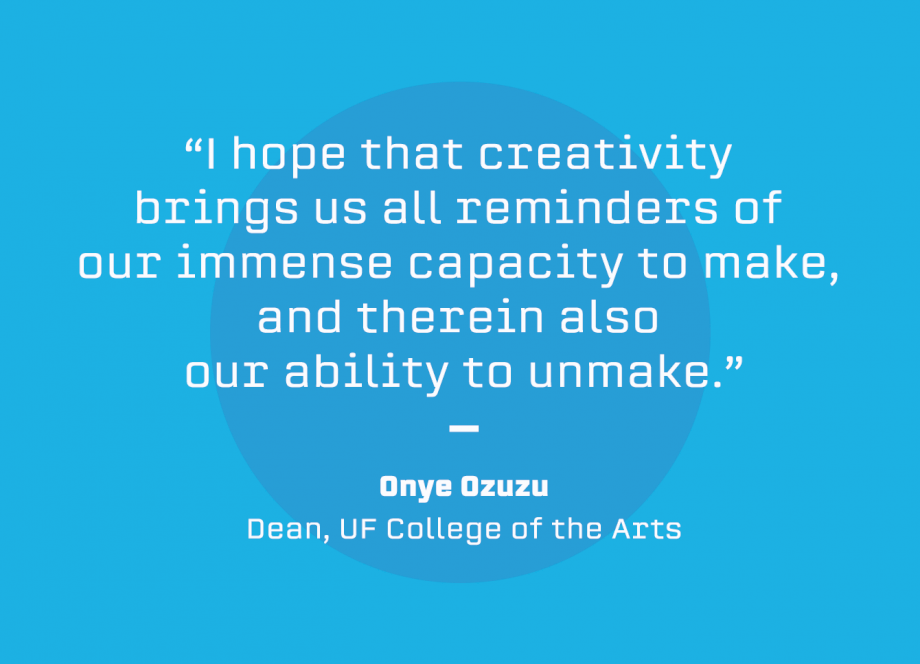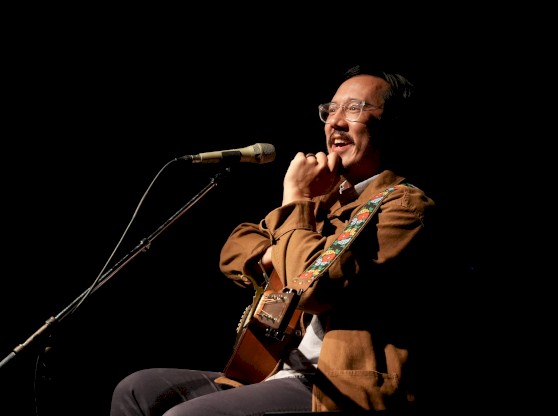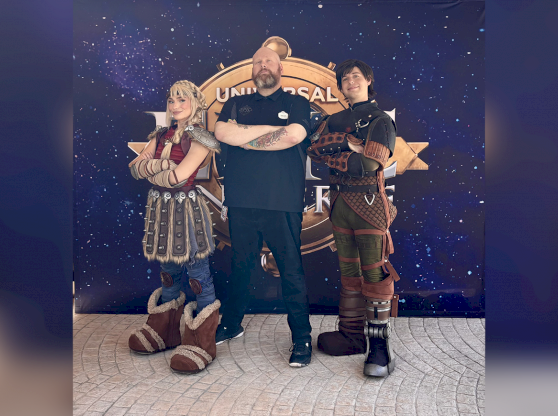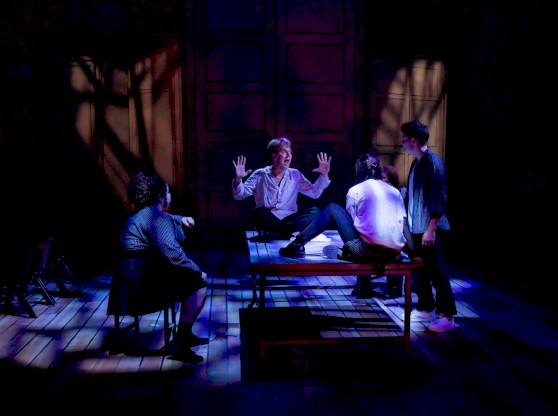As we approach the end of another year, and the days make their annual stretch towards their longest and darkest, our many-cultured communities enact traditions of many and various names and narratives, traditions that turn on our lights against the dark, that gather and raise our voices, that share food, that seek to make beauty, to spark joy. We collectively practice current-day versions of traditions that stretch back generations and embody our human capacity to shape our realities, to cultivate experiences that nourish us, sometimes in the midst of deepening dark.
Looking back over this fall 2021 semester here at the College of the Arts, one of the many things that stands out is the feeling of returning to live and in-person art events. After a year and half of isolation, a collective reckoning with loss, with mortality, with legacies of social and structural inequities, with political destabilization; we ventured back out and towards one another. Our theatres and concert halls and galleries set up, made plans to keep us safe, opened their doors, and welcomed a community hungry for connection and to process and move through all that has and continues to change in our experiences.
The University Gallery (soon to be renamed Gary R. Libby University Gallery), through curator Jesús Fuenmayor, worked with the Cisneros Fontanals Art Foundation and Ella Cisneros to bring a broad and deep array of the foundation’s collection of Latin American abstraction to a show that stretched across our gallery to the Harn Museum. Plural Domains is expansive in the representation of artists from Argentina, Brazil, Colombia, Cuba, Ecuador, Guatemala, Mexico, Peru, Uruguay, and Venezuela; in its many methods and materials; in its not-so-distant historical contexts that for many of us are here viewed through lenses and perspectives that we may be unfamiliar with as. It was striking in its capacity to invite and engage interaction. And it was poignant in its capacities to present us with images that stir the unavoidable questions of our time: Are we prepared? Is our society’s design able to support our humanity? Our sustainability? What is important? What do we want and why? And how do our desires relate to one another? To our collective future?
At Raymond Chobaz’s triumphant concert at the UF Performing Arts Center, our Symphony Orchestra, Concert Choir, the Gainesville Master Chorale, along with faculty members Paul Richards, Jasmin Arakawa, and Will Kesling welcomed guest performers to the stage and called forth a sold-out gathering of our community. I, like many of us, hesitated at the doorway and commented among ourselves that it was the first time we were going to be so close to that many people since the spring of 2020. Shoulder to shoulder with our masks on, anxieties melted away as we were drawn into an experience of Beethoven's 9th Symphony that resonated movement for movement with the discordant juxtapositions of the long and slow journey we have all collectively been on. The music led us methodologically through its layers to a rendition of an Ode to Joy that never felt more earned and brought the house to a collective outpouring of response that still makes the hairs on my arms stand, just thinking of it today.
This year we had the most alumni on the field marching with the band at Homecoming than ever in the history of the Gator Band. I was lucky enough to attend the rehearsal. I was delighted to see band alumni show up out of the woodworks. UF employees who I had no idea were Band alumni walked up smiling with their instruments. The easy rapport between generations of alumni facilitated by their shared experiences in their sections with their instruments and with the caring, jovial, and firmly results-driven leadership resonated through the space. And the next day on the field their resonance was palpable, as they shared that feeling like none other of being completely one inside of a sound (or should I say, GROWL).
Again and again this semester, I experienced our faculty working with one another and with our students to bring to the stage—and to us in the audience—works from other worlds that drew us into a grappling with the complexity of our current context and everyday experiences. Tony Ramirez-Mata directing of the dystopian musical A Little Night Music and the long-awaited premiere of Paul Richard’s opera The Golem of Prague, directed by Anthony Offerle and conducted by Doctor of Musical Arts student Matthew Wardell come to mind. I am humbled to witness the grace and expansive capacity of our faculty who have clearly found ways to reach our students. They have succeeded not only in continuing to build their technical skills and talents in some very challenging contexts; while simultaneously facilitating the space for them to embody the vulnerability to face and experience the content of artworks that were unflinching in their complexity, in their engagement of problems with no easy solutions, the contemplation of the unknown, the unstable, and the probability of more to come.
I sat in the audience next to Bill T Jones in his theatre at New York Live Arts in Manhattan while School of Theatre and Dance AI and the Arts faculty Heidi Boisvert premiered her new work (in progress), Lizardly. Lizardly is a collaboration with Kat Mustatea with the capricious and conceptually puzzling realms and implications of emerging technologies. Heidi’s work had her actors in motion capture suits living in a “smart house” in a Miami of the future preparing for a coming storm. The artificial intelligence of the house was also represented by a live actor. The “set” was projected on a 2-D screen behind the actors where the indoor or outdoor spaces of the world were unclearly separated and the two video game-style lizard avatars of the married couple discussing their crumbling relationship were slowly made aware of the layers and complexities of their situation as the motion capture suits started to fail and track their motion less and less accurately. The gentle hilarity and human frailty in the midst of all the technology were at the same time whimsical and deliberate and made its point deftly in a simple final moment that asserted the urgency of being in our bodies and relating to one another with respect to them.
In these few powerful examples, I am aware that what I describe here is just the tip of the iceberg. These moments where the dream of the audience becomes real and art happens are made possible by long, tireless daily work. Work to inspire, clarify, and hold ourselves accountable for balance, alignment, practice, focus, presence, persistence, and resilience. A tall order to manifest for even the most talented among us, much less facilitate in others, as our faculty do every day. And in this time our faculty, staff, and students have been getting it done under extraordinarily challenging circumstances. It has been a great gift to be a part of and to witness the gracefulness of our creative community, to be reminded of how effective, how essential what we teach, study, make and do is. It has certainly been an extraordinary semester and I want to thank each member of the College of the Arts and our alumni, friends, and supporters for their contributions; thank you so much, for all that you do.
The end of the semester and of the calendar year and the holiday season inevitably turns our attention also towards the future. As I write this the annual Agbedidi concert is getting ready to open tonight with new works from Qudus Onikeku, Trent Williams, and our new faculty member in African Dance, Rujeko Dumbutshena. Next semester, we look forward to more concerts by our bands, choirs, orchestra, and chamber ensembles; BFA and MFA exhibitions; the Digital Worlds Convergence student showcase; dance and theatrical works; and more. Simultaneously the news that the Omicron variant of COVID-19 is now in the U.S. with us and the still present uncertainties of the times we are sharing are nudging back into our planning, with the possibilities of more periods of necessary isolation, and of more loss.
I hope that you have been able to attend some of these powerful offerings from the College of the Arts this semester, these that I described here and many, many others, too numerous to include in full. I hope that—like me—you have been fortified and encouraged, reminded of our humanity, the power in our vulnerabilities, and in our capacity to feel, and think, and make through. I hope that creativity brings us all reminders of our immense human capacity to make, and therein also our ability to unmake. This has been another deeply challenging year for us, collectively, with more to come we see. In the New Year... may the collective “we” make more of what works and unmake what does not.
I hope that your lights will shine bright in the coming weeks and that rest and restoration and the company of good people will be yours.
Be well, artfully.
Onye Ozuzu is the dean of the University of Florida College of the Arts.



